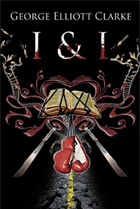|
|
For those fans of the George
Elliot Clarke poem, he has written a rather long one. I &
I is Mr. Clarke's extravagant 231- page poetic novel illustrated
by Lateef Martin. It does not quite have the epic ambition of a Paradise
Lost, this is a modest story of two lovers, but this novel in
verse is a playground for raunchy lovers and frisky language. There
is a sense in which any George Elliot Clarke prose would inevitably
'degenerate' into poetry anyway, such is his felicity with the English
language, and the narrative of I & I is marked by that
trademark liability to spontaneously combust in storms of imagery.
It is also liable to swerve into violence and sex rather than pall.
Such are the natural anxieties of a modern writer that elaborates
a novel in verse. But in the end, it is not momentum that saves
the book as much as the verse itself. The verse is aggressive at
its most sedate, with images colliding from the velocity of the
story itself
Joyce's high-voltage legs bolt
from shocking skirts.
Her high heels click — like knitting needles —
Why write a novel in verse? For the
beauty of course, for the intensity of a new way of apprehending
the ordinary... His shadow's black appetite / Eats the floor,
the bed, the wall. p. 224
This poet does not suffer the euphemism.
He style is gaudy and fresh, his images ripple. (She pours out
a jugular of murder-red wine p.52) The poem proceeds by rude,
free-verse couplet. Betty Brown is the 'auburn skin, almond-oval,
copper-green eyes' femme. Malcolm Miles is her man, the Halifax-based
Malcolm X-loving pugilist. Elliot Clarke, a Nova-Scotia-born seventh-generation
Canadian of African-American and Mi'kmaq Amerindian heritage, clearly
pulls his characters right out from Comfort Drive: Malcolm sports
a Nova Scotian accent, and
By wifing henry, a Black Mi'qmaq,
Namcy certified herself "as good as a bitch"
To her Jodhpurs set:
First person voices — more diary
than soliloquy — are generously mixed in with the spinal third
person narrative. and occasionally a Lowell will speak an ode...
but both Betty and Malcolm will sound like Elliot Clarke, such are
the limitations of this versified vehicle.
There is untypical restraint in Malcolm's
courtship of Betty, and a Shakespearean tint aggrandizes the brassieres
and beaches of their haunts as they dance to the Delfonics and Marvin
Gaye. This gritty story of star-crossed lovers inhabits this
suburb too ugly / For even an imperialist to annex.
In the end few books will indulge this
book's provliivity without descending into pornography, but there
are also few writers that have George Elliot's Clarke's image-laden
articulation and natural affinity for verse. Each couplet is another
etched picture and the poet-author deploys words and pictures with
child-like fervour, spilling into forewords, postscripts, footnotes.
The same efferverscence leavens this book. Indeed, when the images
begin to Stagger about like numbers / In a mobster's tax returns,
you know you are in Elliot Clarke country. |
|
|
|











![]()
![]()


